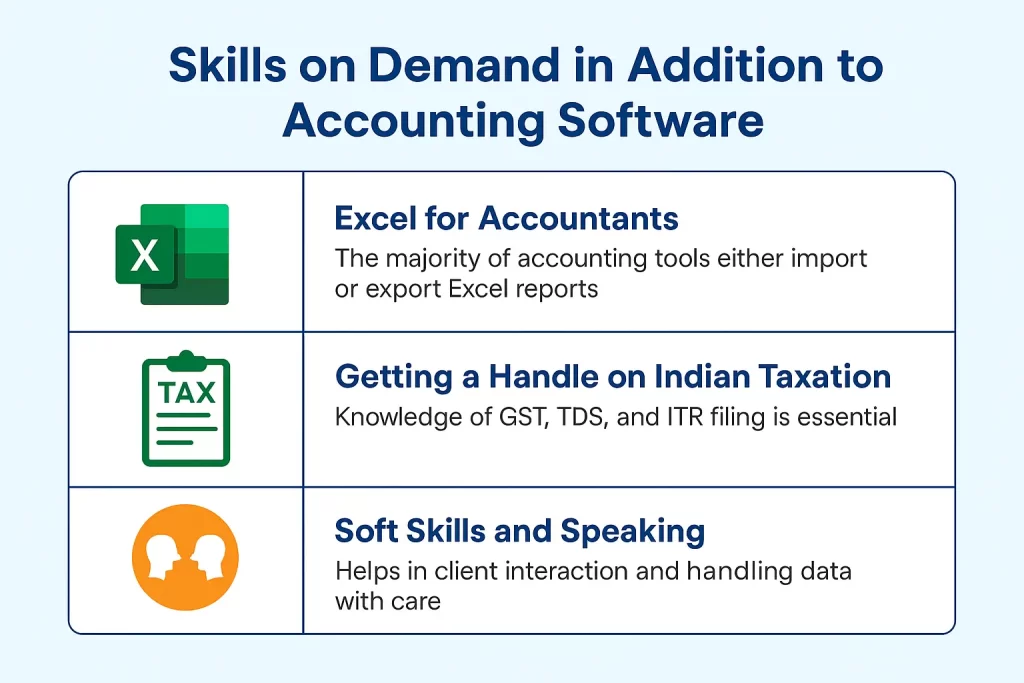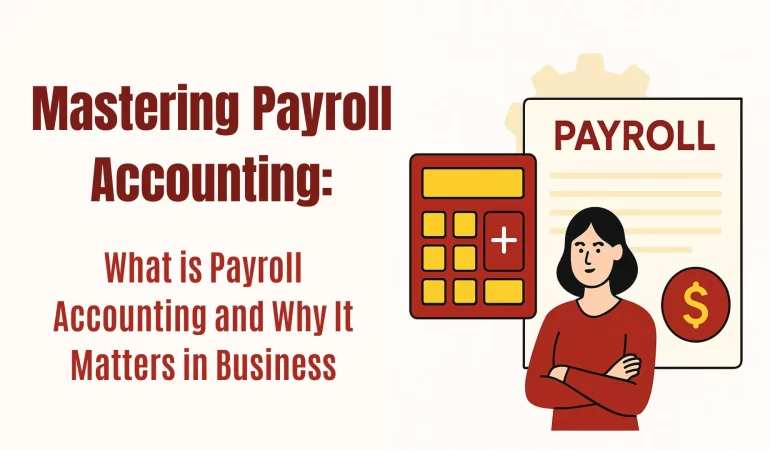HR Payroll Jobs: A Smart Career Choice for a Stable Future
HR Payroll Jobs: A Smart Career Choice for a Stable Future


Introduction
Payroll is one of the most crucial processes in any company — yet it’s often misunderstood.
It’s not just about paying salaries. Payroll ensures legal compliance, boosts employee satisfaction, and supports the smooth functioning of HR. A quality HR payroll course helps professionals master this complex task and opens the door to high-paying HR payroll jobs.
With the right skills, you can access HR payroll jobs in top organizations that value accuracy and transparency. These roles are in high demand, especially for those trained in compliance, incentive structures, and payroll software.
Whether you’re new to HR or looking to grow, earning certification increases your chances of landing top-tier HR payroll jobs.
Professionals trained through EarnReady are prepared for HR payroll jobs that require both strategic thinking and operational excellence.
What Are HR Payroll Jobs?
HR payroll jobs involve managing the payroll process from start to finish. This includes calculating salaries, deducting taxes, handling employee benefits, and submitting returns to government departments. These professionals act as the bridge between HR, finance, and compliance departments.
Common roles in HR payroll jobs include:
Payroll Executive
HR Operations Executive
Payroll Specialist
HR & Payroll Analyst
Compensation and Benefits Manager
Each role focuses on different aspects of payroll management, but all require attention to detail, legal knowledge, and good communication skills.
What Do HR Payroll Professionals Do?
Salary Calculation
Professionals calculate gross and net salary based on attendance, leaves, overtime, and bonuses. This process requires knowledge of tax laws, provident fund rules, and standard payroll practices.
Tax Deduction and Compliance
They ensure timely deduction and deposit of:
TDS (Tax Deducted at Source)
EPF (Employees’ Provident Fund)
ESI (Employees’ State Insurance)
Professional Tax
Payroll Software Management
Modern payroll is handled through software such as GreytHR, Keka, or RazorpayX Payroll. HR payroll professionals must know how to use these tools for smooth salary processing and report generation.
Payslip Generation and Record Maintenance
They are responsible for generating payslips, maintaining payroll records, and ensuring accurate documentation for audits or inspections.
Statutory Filings
HR payroll professionals file returns with government departments and make sure the company stays compliant with all employment laws.
Skills Needed for HR Payroll Jobs
To succeed in HR payroll jobs, professionals must develop a balanced combination of technical expertise and soft skills. These roles demand precision, compliance knowledge, and strong interpersonal capabilities to manage one of the most sensitive areas of HR — employee compensation.
A key requirement for thriving in HR payroll jobs is in-depth knowledge of payroll software. Systems like GreytHR, Keka, RazorpayX, and others are commonly used to manage employee data, process salaries, generate payslips, and file statutory returns. Familiarity with these platforms not only enhances efficiency but also minimizes errors.
Another essential area is a strong understanding of tax laws and labor regulations. Professionals must stay updated with changes in TDS rules, ESI and EPF deductions, professional tax, and other statutory compliance requirements. Mastery of these regulations ensures that payroll is processed legally and on time, which is critical in HR payroll jobs.
Proficiency in Microsoft Excel is another highly valued skill. Whether it’s for preparing reports, analyzing payroll data, or maintaining records, Excel is a vital tool used daily in most HR payroll jobs. Knowledge of formulas, pivot tables, and data validation can make payroll processing smoother and faster.
Attention to detail is a non-negotiable trait. Even a small error in salary disbursement or tax calculation can lead to legal issues or employee dissatisfaction. Therefore, professionals in HR payroll jobs must be highly meticulous and double-check every detail.
Equally important are time management and organizational skills. Payroll follows a strict monthly schedule, and delays are not an option. HR payroll professionals must be able to manage multiple tasks, meet deadlines, and handle unexpected situations calmly and efficiently.
Lastly, confidentiality and integrity are crucial. Payroll professionals handle sensitive information about employee compensation, tax status, and personal details. Maintaining confidentiality and demonstrating ethical behavior are core requirements in HR payroll jobs.
A well-structured HR payroll course can provide the knowledge, tools, and hands-on training needed to master all of these skills. Whether you are just starting or looking to upskill, investing in such a course can significantly improve your chances of success and career growth in the field of HR payroll jobs.

How to Get HR Payroll Jobs
Step 1: Get the Right Training
Start by enrolling in a recognized HR payroll course like the one offered by EarnReady. This course covers:
Basics of HR and payroll
Salary structure and tax deductions
Hands-on training on payroll software
Case studies and real-time payroll scenarios
Step 2: Build Experience
Many companies offer internships or entry-level roles in HR or payroll. Use these to gain practical experience and develop your resume.
Step 3: Prepare for Interviews
Learn common payroll interview questions like:
How do you calculate net salary?
What is the current PF contribution rate?
Which payroll software have you used?
How do you ensure compliance?
Mock interviews and resume building support from EarnReady can help you feel confident.
Step 4: Apply Smartly
Target companies in sectors like:
IT & Software
Manufacturing
Healthcare
Banking and Finance
E-commerce
These industries frequently hire payroll professionals due to their large and growing workforces


Salary Expectations in HR Payroll Jobs
Here’s what you can expect as salary in India for HR payroll jobs:
Entry-Level (0–2 years): ₹2.5 – ₹4.5 LPA
Mid-Level (2–5 years): ₹4.5 – ₹7 LPA
Senior-Level (5+ years): ₹7 – ₹12 LPA
Additional certifications and experience with advanced payroll systems can increase your earning potential.
Why Choose HR Payroll Jobs?
High Demand
Every business with employees needs payroll professionals. With rising compliance requirements, companies are expanding their HR payroll teams.
Stability
Payroll is a recurring process and companies prioritize it. This makes payroll jobs more stable compared to many other corporate roles.
Career Growth
You can start as a payroll executive and grow to become an HR Manager, Payroll Head, or Compensation and Benefits Manager.
Diverse Opportunities
HR payroll jobs are available across industries, giving you the flexibility to work in your area of interest — whether it’s IT, retail, or healthcare.
Tools Used in HR Payroll Jobs
To be successful, you should be familiar with popular tools such as:
GreytHR
Zoho Payroll
RazorpayX
Keka HRMS
QuickBooks Payroll
These platforms simplify payroll processing and reduce the chances of manual errors.
Learn Payroll with EarnReady
EarnReady offers a job-focused HR payroll course that helps you land your dream payroll job. Their features include:
Real-world payroll training
Software-based sessions
Experienced mentors
Resume and interview preparation
Placement support
With EarnReady, you don’t just learn payroll — you become job-ready.
Real-Life Use Case: How Payroll Affects a Company
Imagine a company that misses payroll deadlines. Employees lose trust, morale drops, and talent starts leaving. On the other hand, when payroll is processed accurately and on time, employees feel valued, work harder, and speak positively about the company.
This shows how important HR payroll professionals are — they are the silent heroes behind employee satisfaction and compliance.
Do I need an MBA to get HR payroll jobs?
Is payroll part of HR or finance?
Can freshers get HR payroll jobs?
Importance of HR Payroll in Business: A Must-Know for Every HR Professional
Importance of HR Payroll in Business: A Must-Know for Every HR Professional


Introduction
Payroll is more than just processing salaries—it’s the backbone of employee satisfaction and legal compliance. A well-managed payroll system ensures that employees are paid accurately and on time, boosting morale and trust within the company. But beyond payments, payroll also involves managing taxes, statutory deductions, benefits, and reporting—all of which are critical for legal and financial accuracy.
For businesses, especially startups and growing companies, payroll errors can lead to penalties, employee dissatisfaction, and even reputational damage. That’s why having skilled payroll professionals is vital. They not only keep the company compliant with ever-changing labor laws but also optimize payroll processes for better efficiency.
Enrolling in an HR payroll course is a game-changer for anyone looking to enter or advance in the HR field. These courses offer hands-on training in payroll software, tax regulations, salary structuring, and compliance. You’ll gain practical knowledge that employers highly value—making you a reliable and skilled asset to any organization.
Whether you’re a recent graduate, a working professional, or someone looking to switch careers, ancourse equips you with the expertise to manage one of the most important functions in any business. It’s not just a course—it’s your pathway to becoming a trusted payroll expert.
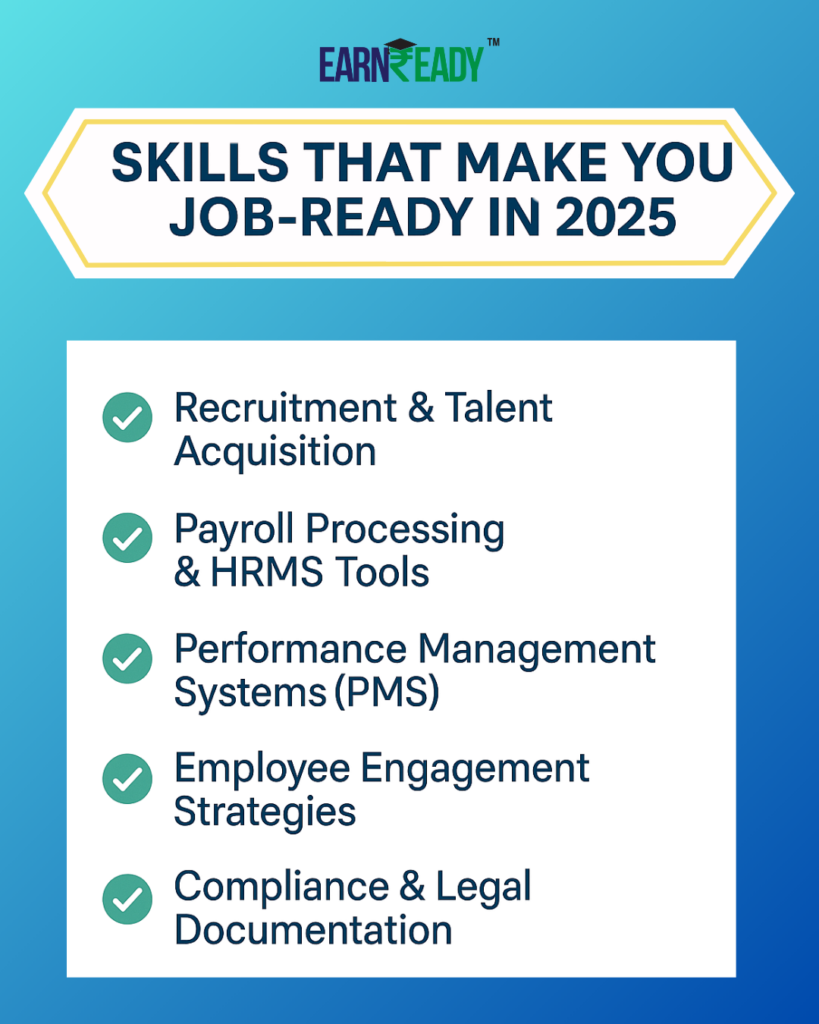
Legal Compliance
A properly managed payroll system ensures your business stays compliant with all applicable laws and regulations. It’s not just about issuing salaries—it’s about maintaining financial and legal discipline. From calculating Income Tax deductions (TDS) to managing contributions like Provident Fund (PF) and Employee State Insurance (ESI), every component must be accurately handled. Mistakes in payroll processing can lead to missed deadlines, government penalties, surprise audits, or even legal action, all of which can damage the company’s reputation and bottom line.
This is where an HR payroll course becomes invaluable. These courses are designed to teach you how to:
Calculate and file taxes correctly, ensuring timely payments and accurate TDS deductions
Maintain PF, ESI, and other statutory contributions, which are essential for employee benefits and compliance
Stay updated with changes in labor laws, so you’re never caught off-guard by new rules or amendments
Handle audits confidently, with complete and well-organized payroll documentation
By mastering these areas, you build legal resilience into the company. A well-trained payroll professional ensures smooth, error-free operations and shields the organization from unnecessary financial and legal risk. Investing in this expertise through an HR payroll course is not just smart—it’s essential.
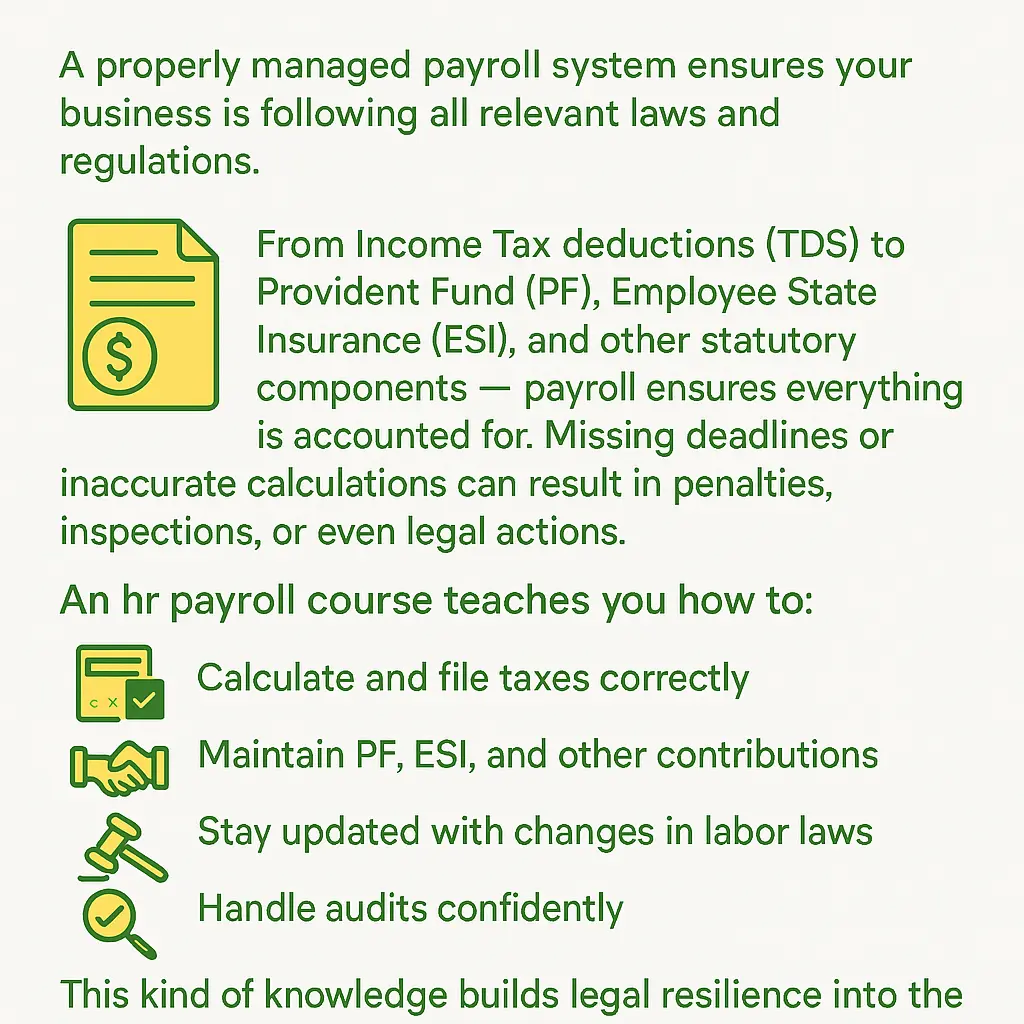
Employee Trust
Employees expect their salary to be processed accurately and on time, every single month. It’s not just a financial transaction—it’s a reflection of how much the company values and respects its workforce. When salaries are delayed or deductions appear unclear, it leads to frustration, lowered morale, and a breakdown in trust between employees and management.
A well-structured payroll system ensures:
Timely salary disbursement, which boosts employee satisfaction and motivation
A clear breakdown of earnings and deductions, so employees understand exactly how their salary is calculated
Regular issuance of payslips, providing a transparent record of salary, taxes, and benefits
Transparency in bonuses, reimbursements, and incentives, reinforcing fairness and accountability
When payroll is managed efficiently, it strengthens employee confidence and enhances workplace culture. A transparent and error-free payroll process reassures employees that they’re being treated fairly and professionally.
An HR payroll course equips professionals with the skills to manage these responsibilities with precision. From leave tracking to overtime and incentive calculations, the course trains you to handle real-time payroll scenarios. This knowledge not only ensures accuracy but also builds trust between employees and the organization—making payroll management a key driver of employee morale and retention.


Financial Planning
Payroll data is crucial for accurate financial forecasting and effective cost control. In any organization, understanding the full scope of HR is key to managing manpower expenses wisely. HR insights allow businesses to evaluate the true cost of their workforce, from monthly salaries to additional statutory expenses such as Provident Fund (PF), Gratuity, and Employee State Insurance.
One of the major benefits of mastering HR data is its role in budgeting for new hires. When expanding a team, companies need clear visibility into current and projected payroll expenses. Similarly, HR analysis supports calculating annual raises, bonuses, and other compensation adjustments in a financially sustainable way.
Without proper practices, businesses often face unplanned costs or poorly allocated funds. That’s why comprehensive payroll training programs include modules on budgeting, forecasting, and payroll reporting. These tools not only ensure compliance but also enhance financial efficiency.
payroll analytics empower HR professionals and finance teams to make smarter, data-driven decisions. With a firm grasp of HR metrics, companies can align their human capital strategy with long-term business goals. In today’s competitive environment, understandingis more than an administrative task—it’s a strategic advantage.
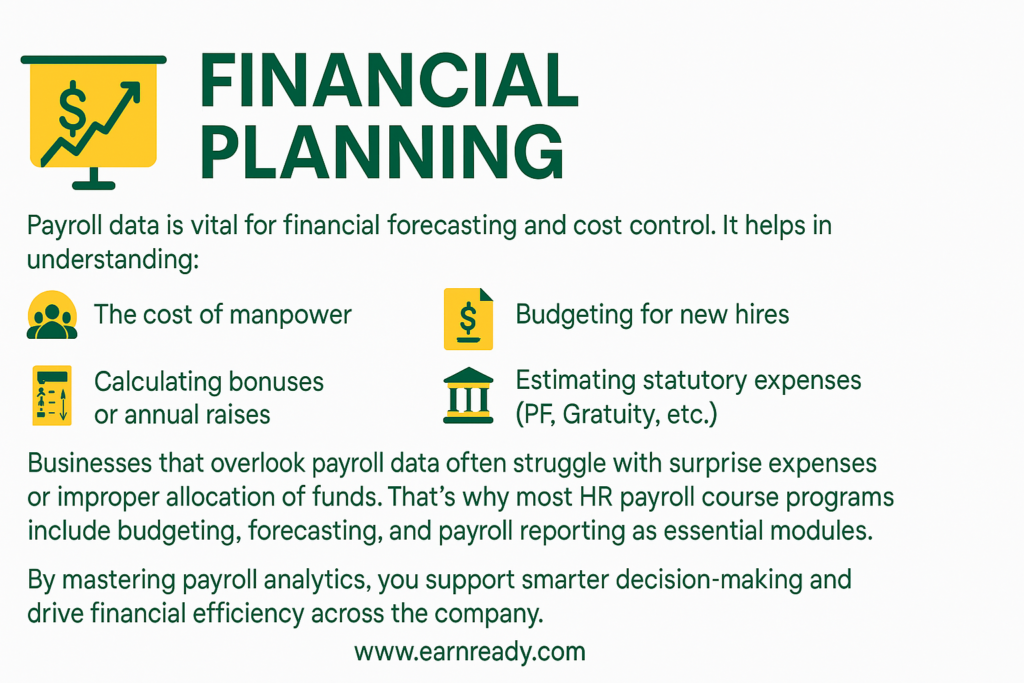
Reputation Management
In today’s connected and fast-paced business world, even a single payroll error can significantly damage a company’s reputation—both internally with employees and externally with the public. A delayed salary, tax miscalculation, or missed compliance filing can trigger a cascade of negative outcomes. These may include poor reviews on job portals, a rise in employee resignations, government-imposed fines or audits, and even a loss of investor trust.
That’s why HR payroll accuracy is not just a back-office concern—it’s a frontline issue that impacts brand reputation and employee satisfaction. Organizations that prioritize management reduce the risk of such damaging errors. Skilled professionals trained in HR payroll are essential to ensuring timely salary processing, accurate tax deductions, and full statutory compliance.
Many companies now recognize the importance of investing in talent. Enrolling HR professionals in a certified HR payroll course provides them with the tools and knowledge to manage payroll operations with precision. From understanding tax regulations to mastering payroll software, these courses are designed to build expertise in all aspects .
Ultimately, a strong system supports smooth internal processes and maintains a company’s credibility. In today’s competitive market, mastering HR payroll is a smart move toward long-term success.


Why Learn Payroll?
Still wondering why you should invest in an payroll course? Here are some powerful reasons that make it a smart career move—whether you’re starting out in HR or looking to specialize.
HIGH DEMAND FOR PAYROLL SKILLS
Every business, big or small, relies on accurate payroll processing. With increasing focus on labor laws and compliance, skilled HR professionals are in constant demand. Companies actively seek individuals with HR expertise to manage complex pay structures, taxes, and employee benefits.
BETTER CAREER OPPORTUNITIES
An HR payroll course equips you with niche skills that are valued in both HR and finance departments. Whether you’re aiming for a corporate HR role or a payroll analyst position, mastering HR payroll can lead to better salaries and faster promotions. It’s a career path that blends administration, compliance, and financial acumen.
REAL-WORLD PAYROLL TOOLS
Top HR courses provide hands-on training with tools like Zoho Payroll, GreytHR, and Excel automation. Learning how to use these tools efficiently makes you job-ready across industries.
LEGAL CONFIDENCE
With the right HR payroll training, you’ll understand tax filing, deduction management, and legal compliance—skills that reduce company risk and boost your professional credibility.
An payroll course isn’t just education—it’s career empowerment.

Learn from the Best: EarnReady HR Payroll Course
Looking for a practical and job-oriented HR payroll course? EarnReady offers everything you need to build a strong foundation and launch a successful career in payroll management.
With real-time payroll processing training, you’ll gain hands-on experience in managing salary structures, deductions, and statutory compliance. The course includes case studies on tax filing, PF, and ESI—giving you the confidence to handle real-world scenarios that HR payroll professionals face every month.
EarnReady’s HR payroll course also comes with certification and 100% job assistance, making it ideal for freshers and working professionals looking to upskill. You’ll get exposure to live payroll software like Zoho Payroll and GreytHR, which are widely used across industries, ensuring you’re job-ready from day one.
In addition to technical payroll skills, the course supports your career journey with resume building and interview preparation sessions. This combination of practical training and career support gives you a competitive edge in the job market.
Whether you’re starting your career or upgrading your skills, EarnReady’s HR course is designed to help you master payroll and secure better opportunities. With expert guidance and real-world practice, you’ll become the go-to payroll expert every company needs.


Who Should Take an HR Payroll Course?
If you’re wondering who can benefit the most from an HR course, the answer is—almost anyone looking to grow in the HR or finance domain.
HR freshers who are just starting their careers can use an HR course to gain a valuable specialization. It helps them stand out in interviews by demonstrating practical knowledge of payroll processing, tax deductions, and compliance—skills that are in high demand.
Finance graduates often seek a niche skill to complement their degree. Learning HR gives them a unique edge, as it combines financial knowledge with practical HR functions, opening up roles in payroll analysis, HR operations, and compliance management.
MBA (HR) students preparing for placements will find that adding to their skill set makes them more competitive. Recruiters often prefer candidates who understand not just HR theory but also have hands-on experience with payroll systems and statutory requirements.
Working professionals aiming for promotions or a role switch into HR operations, compensation & benefits, or payroll management can benefit immensely from specialized HR payroll training.
In short, an course is a strategic investment for anyone who wants to grow, specialize, or transition in their career with confidence and competence.
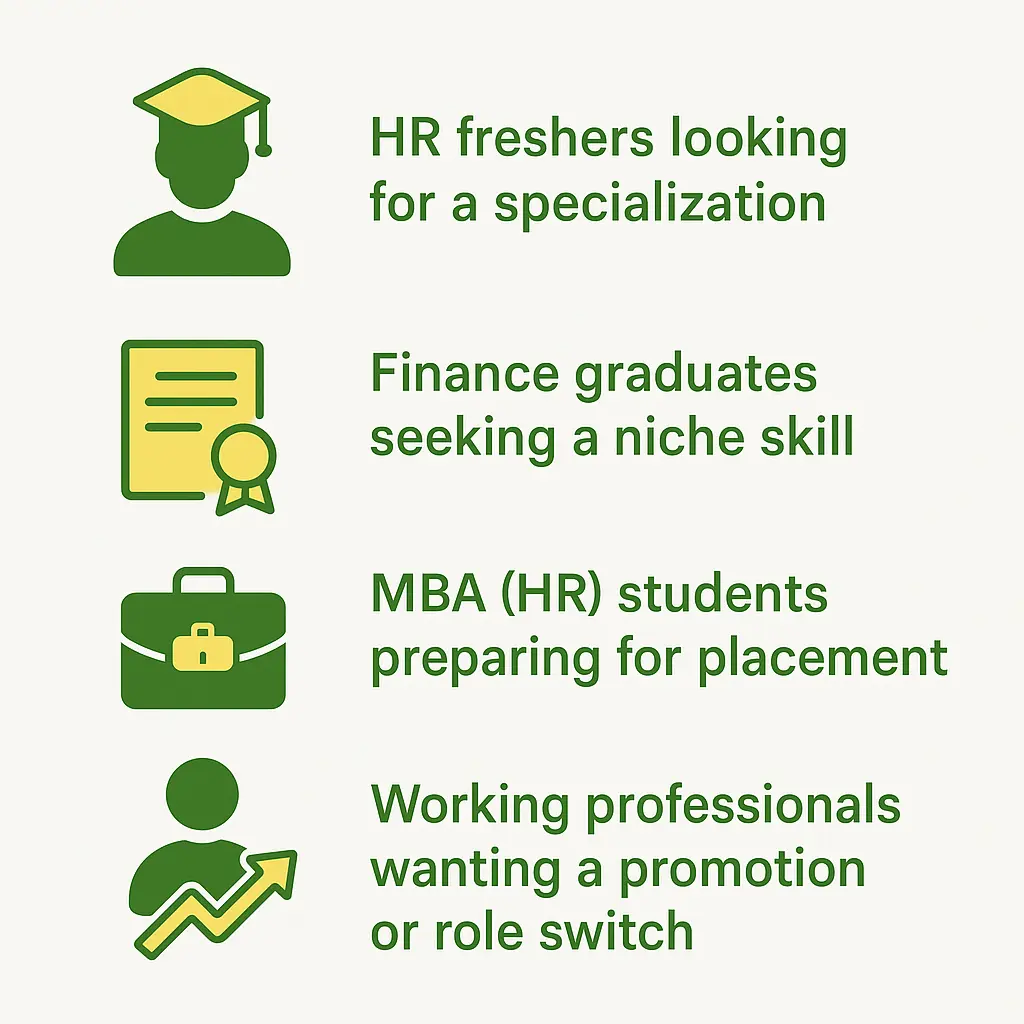
Will I get practical training?
What is the salary scope?
Do I need prior experience?
Mastering Payroll Accounting: What is Payroll Accounting and Why It Matters in Business
Mastering Payroll Accounting: What is Payroll Accounting and Why It Matters in Business


Table of Contents
- Introduction to Payroll Accounting
- Key Components of Payroll Accounting
- Payroll Accounting Process Explained
- Payroll Accounting vs. General Accounting
- Common Payroll Accounting Software
- Challenges in Payroll Accounting
- Career Opportunities in Payroll Accounting
- Learn Payroll Accounting Professionally
- FAQs about Payroll Accounting
Introduction
In the evolving world of business management, payroll remains a critical aspect that directly affects employee satisfaction and legal compliance. But many still wonder — what is payroll accounting? It goes beyond simply paying salaries. A structured financial system known as payroll accounting keeps businesses in compliance with labor and tax laws while also ensuring that employees are paid accurately and promptly. Understanding what is payroll accounting is essential for HR professionals, accountants, business owners, and aspiring job seekers aiming to enter the finance or human resources industry.
What exactly is payroll accounting?
The term “payroll accounting” is used to describe the process of keeping track of, managing, and recording employee compensation, such as wages, bonuses, tax deductions, and so on. It ensures that tax obligations are met without error and that employees are paid appropriately. Gross wages are calculated, deductions are subtracted, tax reports are filed, and each transaction is recorded in the company’s financial records as part of payroll accounting. Knowing what is payroll accounting allows businesses to maintain transparency and legal compliance.


Why is Payroll Accounting Important for Businesses?
Understanding what is payroll accounting helps in realizing its business significance. It plays a major role in:
Ensuring accurate payment to employees
Preventing legal penalties through tax compliance
Fostering employee confidence
Keeping accurate financial records
Fines, employee dissatisfaction, and legal issues are all possible outcomes for businesses that neglect or mishandle payroll accounting that’s why understanding what is payroll accounting is important.

Key Components of Payroll Accounting
Employee Compensation
Employee compensation is the foundation of payroll accounting. It includes commissions, performance bonuses, overtime pay, basic salary, and other benefits. Accurately recording these elements ensures compliance with labor laws and fairness to employees.
Deductions and Benefits
Payroll accounting manages various statutory and voluntary deductions such as:
Income Tax
The Provident Fund
Professional Tax
Employee State Insurance (ESI)
It also includes benefits like health insurance, retirement plans, and paid leaves.
Employer Contributions
Employers must contribute to statutory schemes like PF and ESI. Understanding what is payroll accounting helps ensure these are properly calculated and recorded.
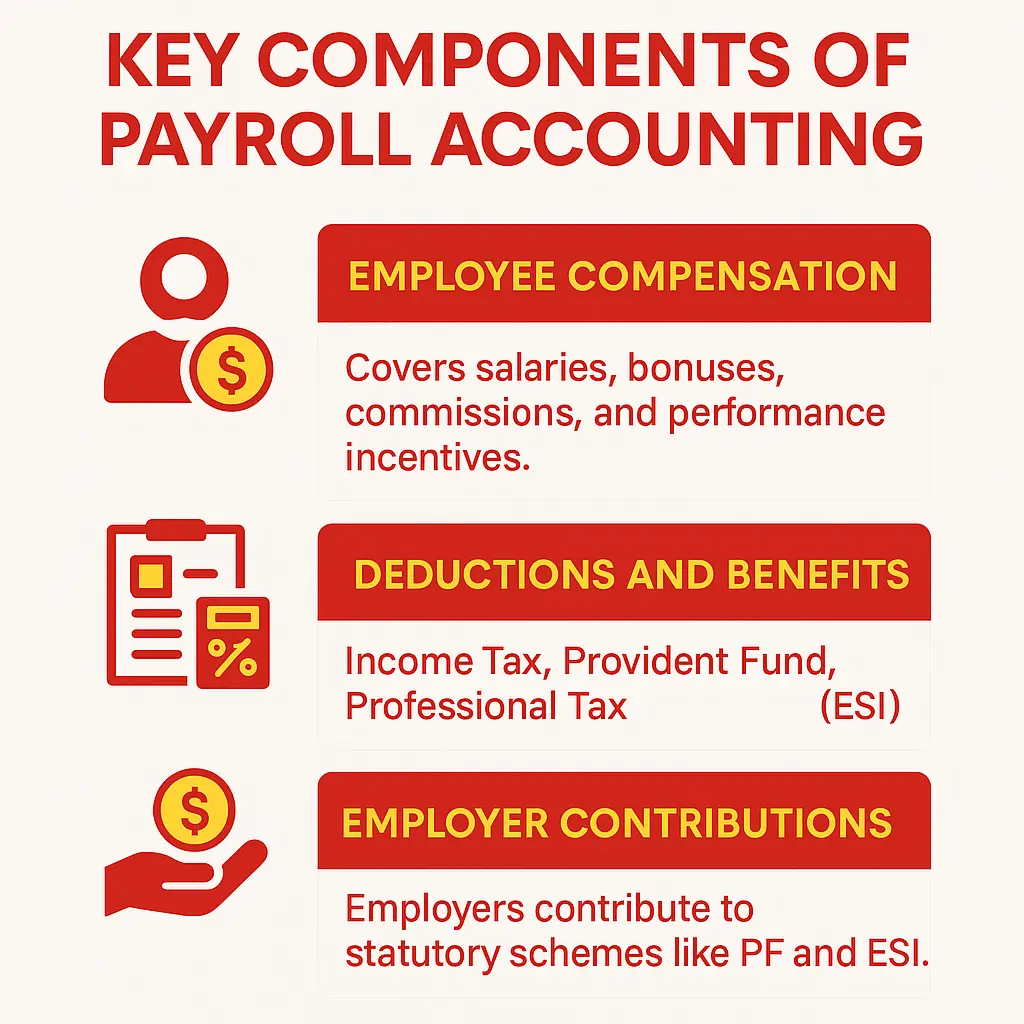
Payroll Accounting Process Explained
Recording Payroll Transactions
All payroll-related transactions are recorded in journal entries. The deductions, net pay, and gross wages are all meticulously accounted for. Audits are made easier and financial transparency is promoted as a result.
Tax Calculations and Deductions
Payroll systems calculate applicable taxes and automatically deduct them from employee salaries. These deductions are then submitted to the government, avoiding penalties and non-compliance.
Payslip Generation and Reporting
Employees receive payslips that detail their earnings, deductions, and take-home salary. Transparency and future reference depend on these reports.

Payroll Accounting vs. General Accounting
Differences in Process and Purpose
Payroll accounting specifically deals with employee compensation, while general accounting records all company financials. It requires additional attention due to tax regulations and employee entitlements.
Why Payroll Requires Specialized Knowledge
Knowing “what is payroll accounting” means knowing that it is a very specific field. To effectively manage it, accountants need to be familiar with payroll software systems, tax codes, and labor laws.


Common Payroll Accounting Software
Top Software Used in India
Some popular software tools used in India for payroll accounting include:
GreytHR
Keka
Zoho Payroll
ADP India
Saral PayPack
These tools make make the understanding of “what is payroll accounting ” easier and streamline the payroll process, reduce errors, and ensure timely disbursements.
Features to Look for in Payroll Tools
When choosing a payroll tool, make sure it offers:
Tax compliance automation
Creation of pay stubs
Multi-location support
Employee self-service portal
Integration with attendance systems
These features make it easier for businesses to manage employee compensation efficiently.

Challenges in Payroll Accounting
Compliance and Legal Issues
Payroll accounting must comply with multiple laws, including the Payment of Wages Act, Income Tax Act, and EPF Act. Failing to comply may result in audits, fines, or legal proceedings.
Manual Errors and Delays
Manual payroll processing can lead to human errors, delayed payments, and miscalculations. Using payroll software helps solve these problems and makes operations run more smoothly.
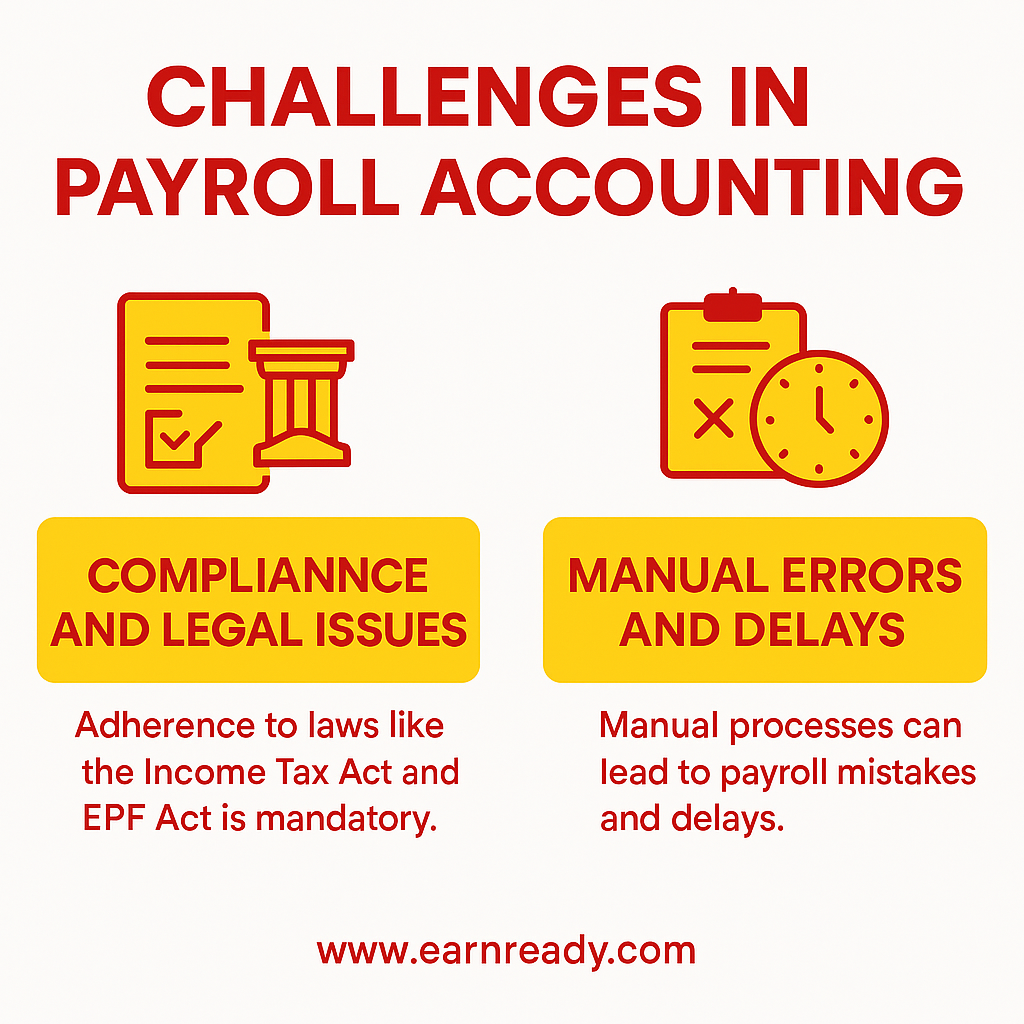
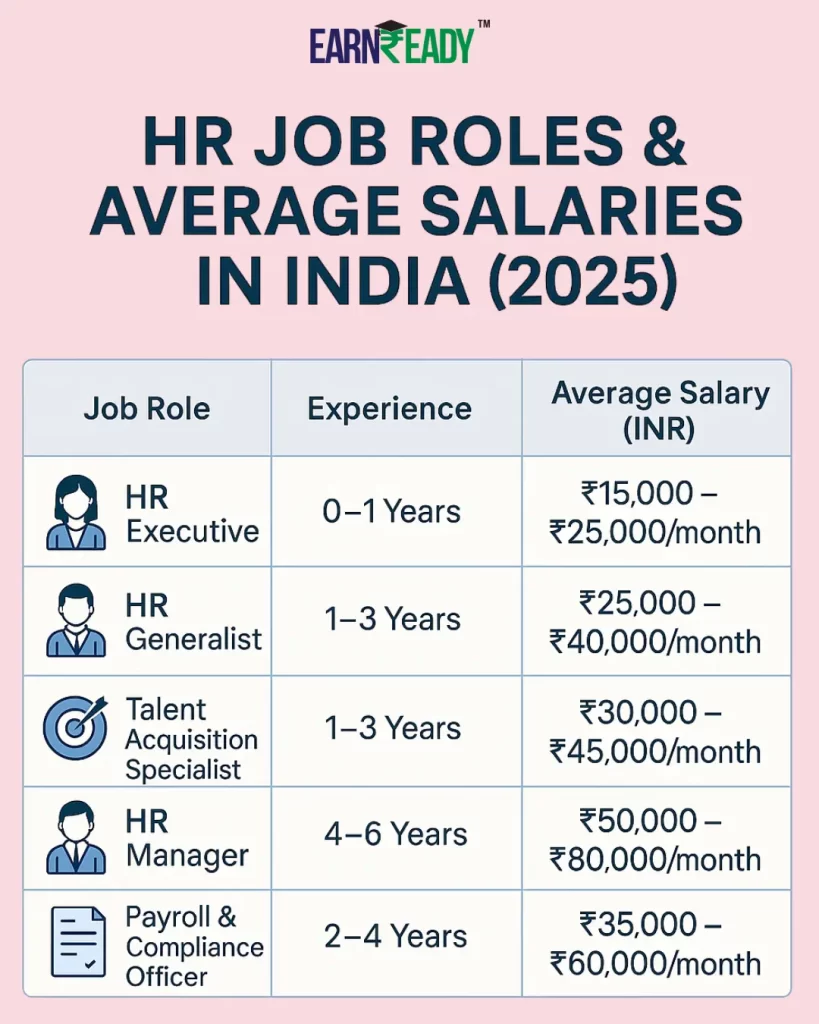
Career Opportunities in Payroll Accounting
In-Demand Job Roles
Understanding what is payroll accounting opens up many lucrative career paths:
Payroll Accountant
HR Payroll Executive
Specialist in Payroll
Manager of Compensation and Benefits
Finance Officer with Payroll Specialization
These roles are essential in every organization and often come with long-term growth potential.
Skills Required for Payroll Accounting Professionals
To thrive in payroll accounting, professionals should have:
Knowledge of tax laws and labor regulations
Knowledge of payroll software
Analytical thinking
Attention to detail
Communication skills
Certified professionals in payroll accounting often receive better salary packages and faster career progression.
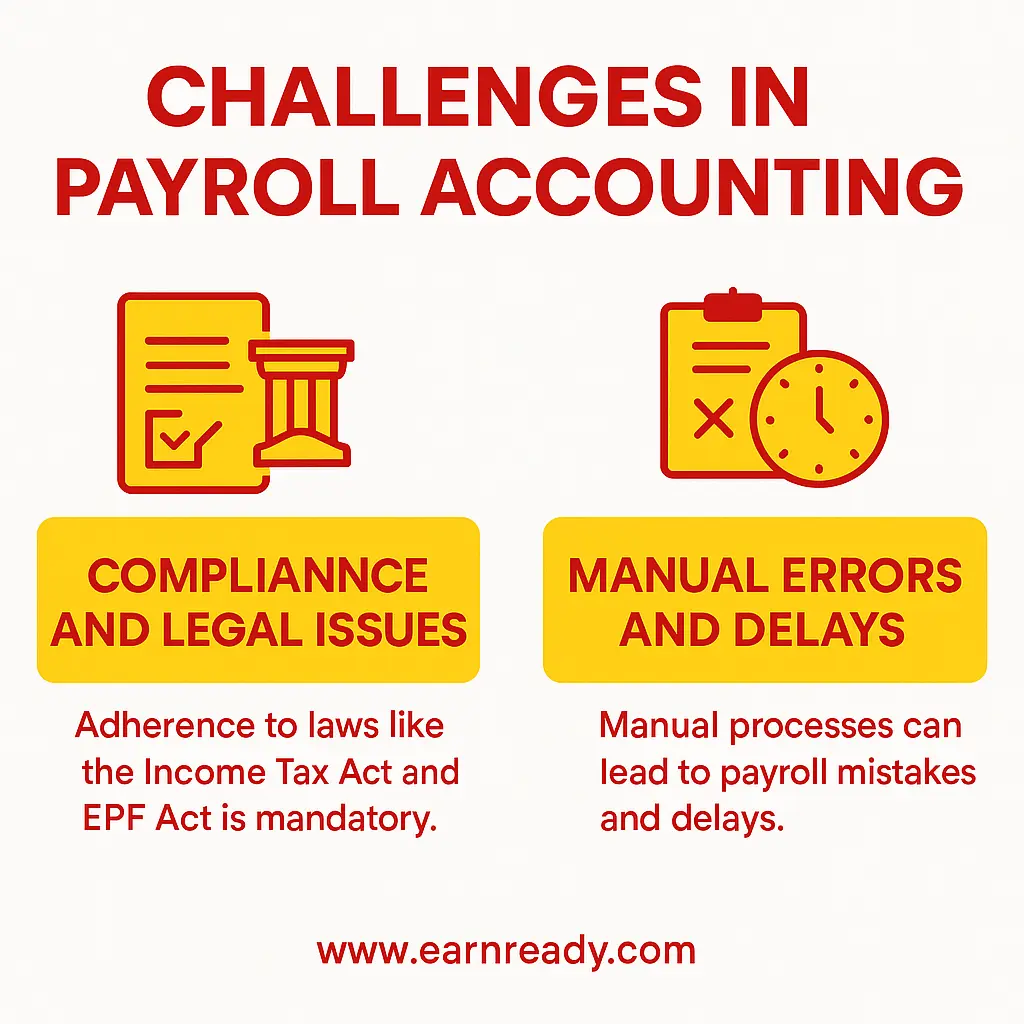
Gain professional experience in payroll accounting
Courses to Get Started
If you’re serious about building a career in HR or finance, don’t just ask what is payroll accounting — learn how to master it.
EarnReady offers one of India’s best courses in HR and Payroll Accounting, including:
Online live classes
Hands-on payroll software training (Zoho Payroll, Excel, etc.)
Real-time projects and case studies
Resume building and interview preparation
100% job assistance
Benefits of Certification in Payroll Accounting
Certified payroll professionals gain:
Better salary packages
Greater job stability
Increased trustworthiness among employers
Access to top HR and accounting roles
If you’re a student, job-seeker, or working professional, this is your gateway to a high-paying, stable, and respected career.
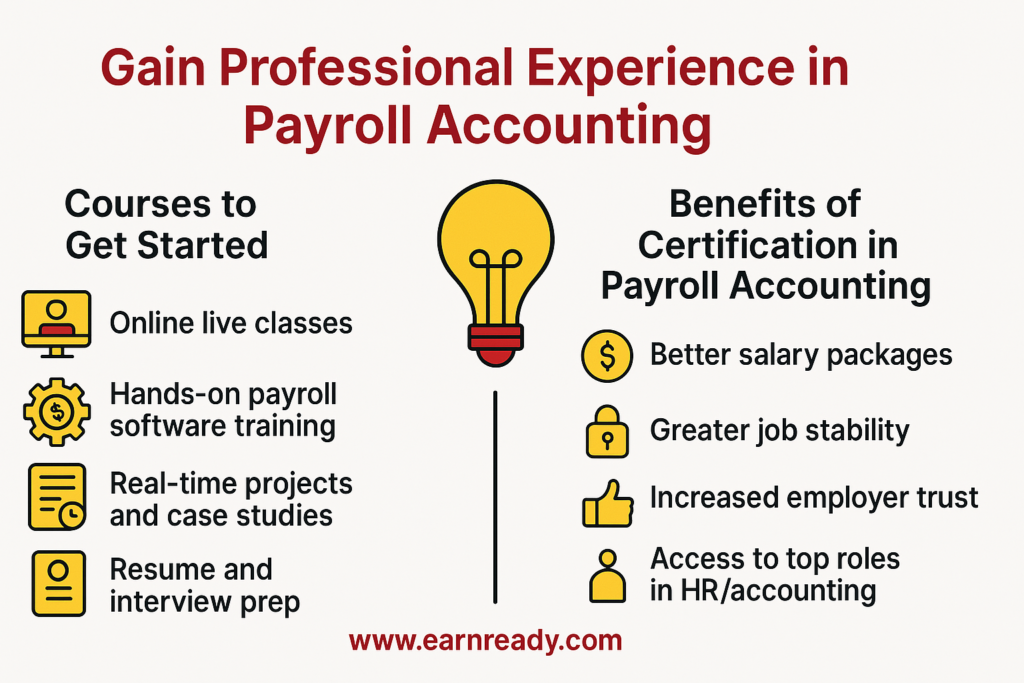
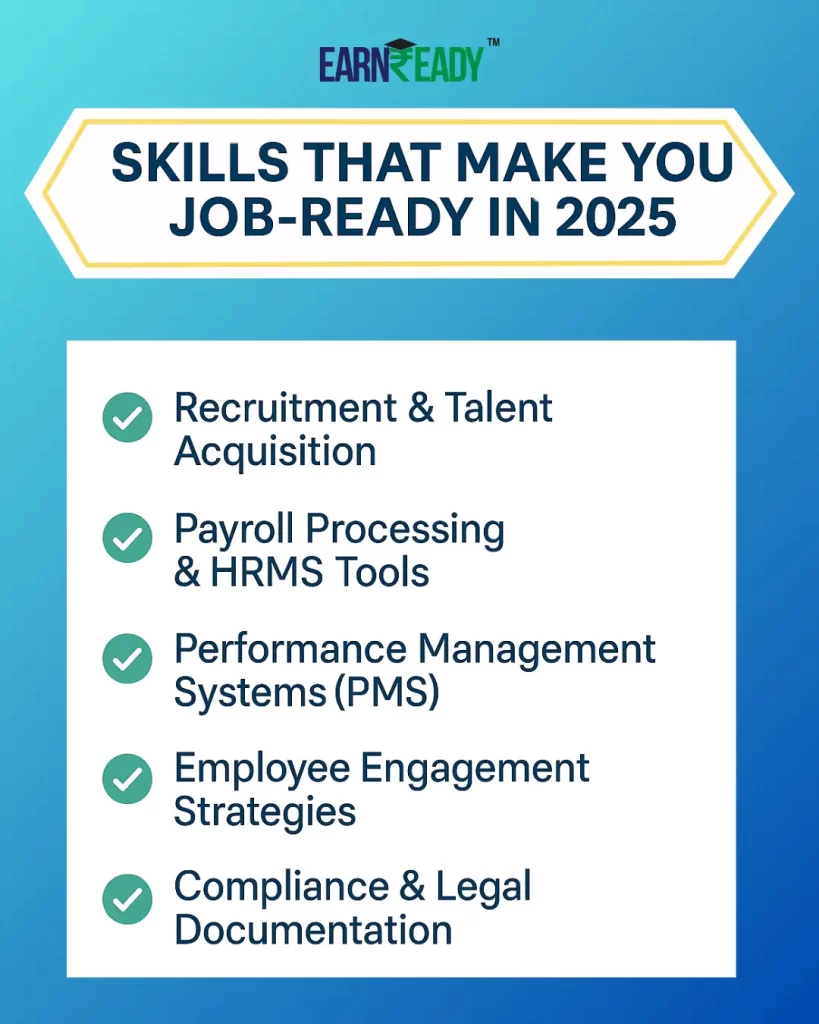
What qualifications are needed?
How much can a payroll accountant earn?
Is payroll accounting needed in small businesses?
Ultimate Guide: What is HR Payroll and Why It’s a Game-Changer for Businesses
Ultimate Guide: What is HR Payroll and Why It’s a Game-Changer for Businesses
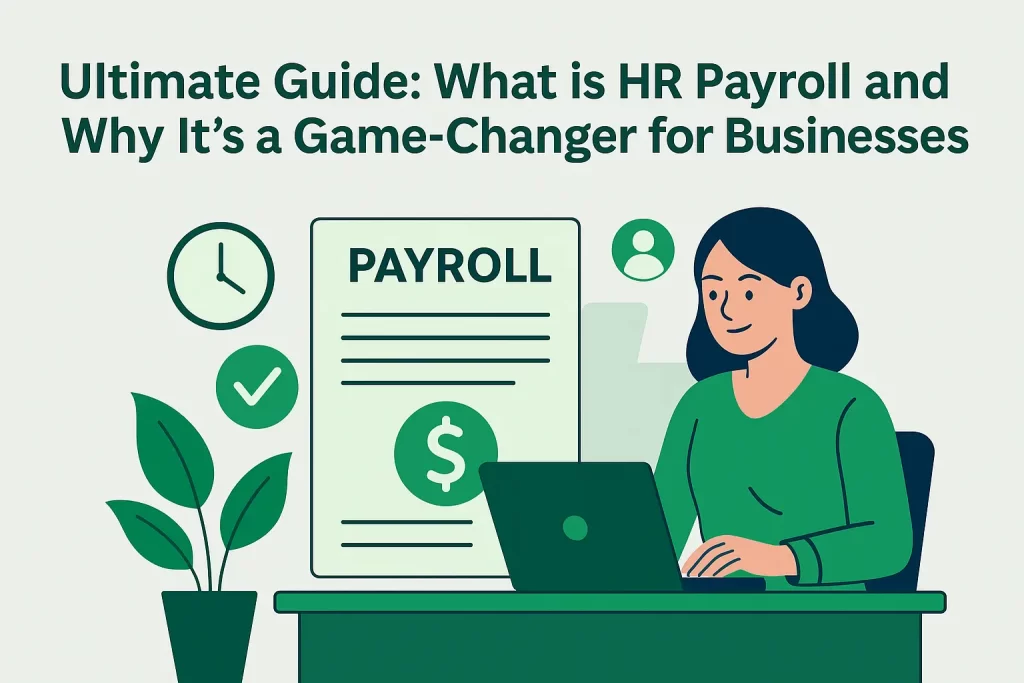

Introduction
In today’s competitive job market, businesses are constantly looking for effective ways to manage their workforce. Payroll is one of the most critical yet often misunderstood parts of business operations. If you’re wondering what is HR payroll, you’re not alone. Understanding HR payroll is essential for smooth employee management, legal compliance, and building employee satisfaction—whether you’re an HR professional, business owner, or student.
What is HR Payroll?
What is HR payroll? In simple terms, it is the process through which an organization handles employee compensation. This includes calculating salaries, withholding applicable taxes and deductions, managing bonuses, and ensuring timely salary disbursement.
In addition to salary processing, HR payroll also involves regulatory filings, maintaining records, and managing employee benefits. It connects the HR and finance departments and plays a key role in managing staff and meeting legal obligations.
Payroll isn’t just about processing payments—it requires thorough knowledge of tax structures, financial laws, and HR policies. When done right, HR payroll boosts efficiency, transparency, and employee trust.


Components of HR Payroll
To understand what is HR payroll, it’s important to break it down into its core components. Payroll involves more than cutting cheques at the end of the month.
Salary Structure
The salary structure is the foundation of any payroll system. It consists of basic pay, House Rent Allowance (HRA), transport allowance, medical benefits, bonuses, and other incentives. A transparent salary structure ensures clarity and reduces confusion or conflict among employees.
Deductions and Benefits
Payroll also includes mandatory and voluntary deductions like:
Income Tax
Provident Fund (PF)
Employee State Insurance (ESI)
Professional Tax
Simultaneously, HR payroll involves managing benefits like health insurance, gratuity, paid time off, and retirement contributions. Accurate handling of these elements is essential for compliance and employee morale.
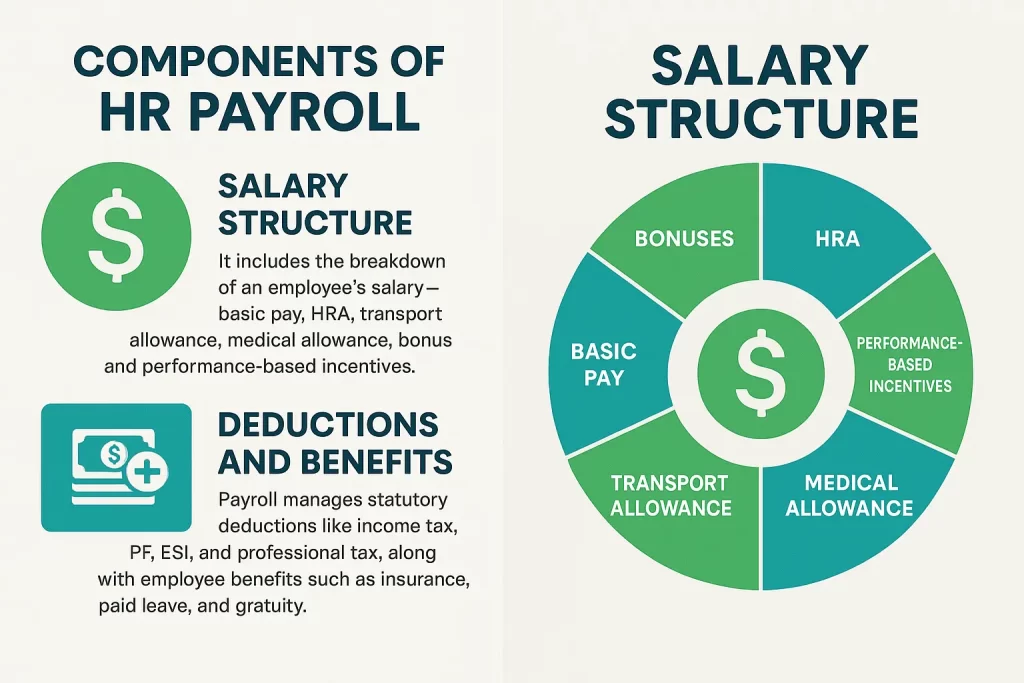
How HR Payroll Works in a Company
Understanding what is HR payroll means knowing the actual steps it involves within a company:
Data Collection – Gathering attendance, leave, and performance records.
Salary Calculation – Calculating gross and net salaries after deductions and taxes.
Disbursement – Transferring salaries to employee accounts on time.
Compliance Filing – Submitting TDS, PF, and ESI to government agencies.
Payslip Generation – Issuing payslips showing detailed salary breakdown.
Payroll typically runs monthly, but preparations begin weeks ahead. It requires strong coordination between HR, accounts, and IT teams.


Importance of HR Payroll in Business
If you’re still asking yourself what is HR payroll good for, the answer lies in its importance:
Legal Compliance – Helps fulfill tax obligations and labor laws.
Employee Trust – On-time, accurate salary boosts trust and engagement.
Operational Efficiency – Reduces errors and saves time through automation.
Reputation Management – Prevents penalties and ensures a good employer brand.
Financial Planning – Payroll data supports budgeting and cost control.
An efficient HR payroll system is a backbone of any growing business.

HR Payroll Software Systems
With digital transformation on the rise, manual payroll processes are being replaced with smart payroll software. Knowing what is HR payroll also means understanding the tools that make it work smoothly.
Top Payroll Software in India
GreytHR
Keka
Zoho Payroll
ADP India
Saral PayPack
These platforms help automate salary calculations, generate payslips, ensure tax compliance, and reduce errors.
You can explore more about payroll systems from this
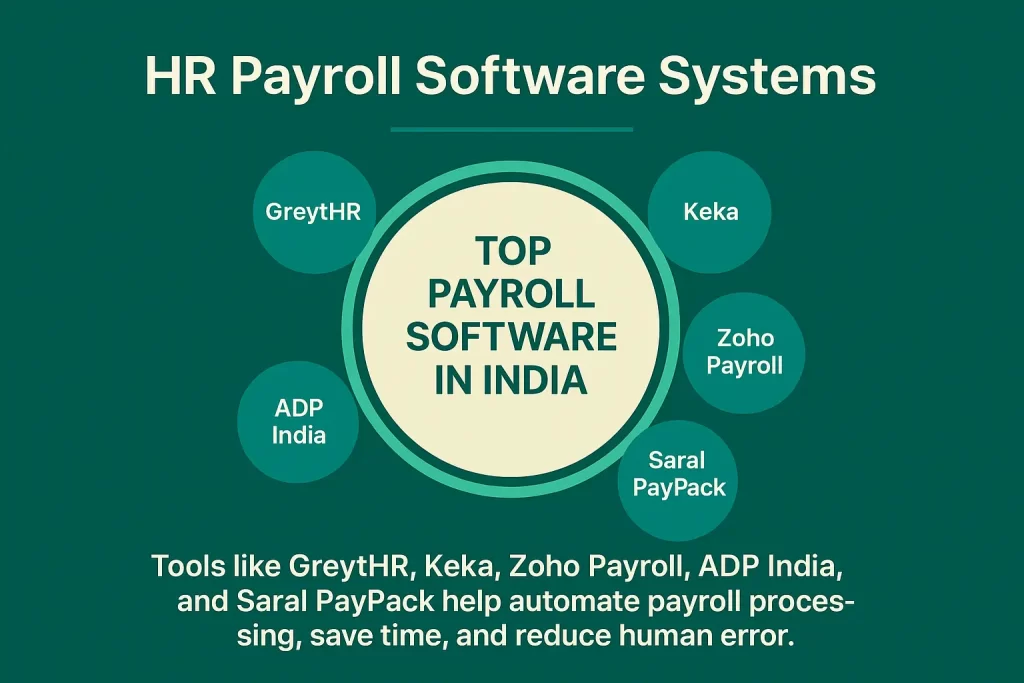

Career Opportunities in HR Payroll
Once you understand what is HR payroll, you’ll realize how it unlocks lucrative career paths.
Popular Job Roles
Payroll Executive
HR Executive – Payroll
Payroll Analyst
Compensation & Benefits Manager
HRIS (Human Resources Information System) Specialist
Essential Skills
Strong knowledge of Indian labor laws and tax structures
Expertise in payroll software
Data analysis and reporting
High attention to detail
Strong communication and confidentiality
Certified payroll professionals are in high demand, especially in industries like IT, finance, and manufacturing.


Learn HR Payroll with EarnReady
It’s not enough to just ask what is HR payroll—you need practical knowledge. That’s where EarnReady comes in. EarnReady offers India’s most practical HR course with payroll training tailored for job-readiness.
Course Highlights
Live classes with industry professionals
Hands-on training in Excel, Zoho Payroll, and Keka
Real case studies and assignments
Resume-building and interview prep
Guaranteed job placement support
Whether you’re a fresher or switching careers, EarnReady equips you with the skills employers want. Their training covers everything from basics to advanced payroll processing.

What is HR payroll and how is it different from general payroll?
2. Is HR payroll essential for small businesses?
3. Which payroll software is best for Indian companies?
Best Accounting Software in India – Trusted Tools for Accountants
" Best Accounting Software in India – Trusted Tools for Accountants"

Image of post regarding course
Table of Contents
- Introduction
- Why Accountants Need to Know About Accounting Software
- Key Features to Look for in Accounting Software
- Top 7 Best Accounting Software in India for Accountants to Learn in 2025
- The Best Certification Programs in India to Learn Accounting Software
- Skills on Demand in Addition to Accounting Software
- Most Commonly Asked Questions
Introduction Every accountant who wants to advance their career, simplify their finances, and remain in compliance with the most recent GST regulations needs to have access to the best accounting software available in India. Learning the right software can lead to high-paying jobs for students, business owners, and finance professionals alike.
olffer image

Why Accountants Need to Know About Accounting Software
With the increasing digitization of finance and taxation in India, accountants must be tech-savvy. Professionals with the ability to effectively manage ledgers, file GST returns, and analyze financial data are now in high demand from businesses. From startups to MNCs, every business relies on accounting software to keep their books clean. The right tool can significantly reduce human error and save hours of manual labor.
olffer image

Key Features to Look for in the Best Accounting Software in India
GST Completion The Goods and Services Tax is the central component of India’s tax system. For easy filing and billing, make sure the software you learn has built-in GST compliance.
User-Friendly InterfaceEven for novices, using an intuitive interface makes learning simple.
Using the Cloud Modern software solutions offer cloud access, which is ideal for remote teams and data security.
Electronic Reporting Time is saved and the likelihood of making mistakes in financial reports is reduced by automation and the demand for tally is increasing.

Top 7 Best Accounting Software in India for Accountants to Learn in 2025
1. TallyPrime – The Most Popular Choice For a number of years, Tally has dominated the Indian market. TallyPrime is the updated version and offers a user-friendly interface with comprehensive features.
Key Features:
GST Billing
Inventory Management
Payroll
Banking Integrations
2. Zoho Books – Best for Cloud Accounting Zoho Books is ideal for freelancers, new businesses, and established ones. It is cloud-based and reasonably priced.
Key Features:
GST-compliant
Automated payment reminders
Bank reconciliation
Real-time collaboration
3. QuickBooks – Trusted Globally QuickBooks by Intuit is well-known all over the world and has a lot of features for Indian users.
Key Features:
Invoicing
Expense tracking
Multi-currency support
Mobile accessibility
4. Marg ERP – Ideal for Distribution and Retail Marg ERP is widely used by retailers and pharmaceutical companies in India.
Key Features:
GST Invoicing
Barcode Integration
Inventory tracking
Custom modules
5. Busy Accounting Software – For SMEs Another piece of software developed locally that caters to small and medium-sized businesses is called Busy.
Key Features:
Financial accounting
GST compliance
MIS reports
Multi-location inventory
6. SAP Business One – For Big Businesses Large businesses that require in-depth analytics and reports can benefit from SAP Business One.
Key Features:
Real-time analytics
ERP components
CRM Integration
Multinational compliance
7. Wave Accounting – Free and Beginner-Friendly If you’re starting your accounting journey, Wave is a great entry point.
Key Features:
Free forever
Easy interface
Receipts & invoices
Suitable for freelancers
need more information related to accounting check this here
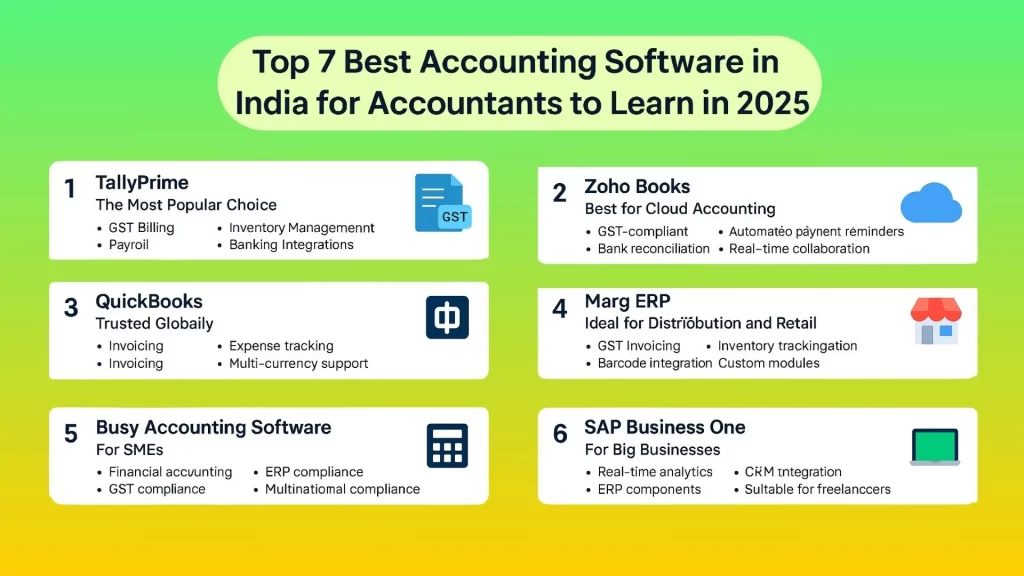
Should You Choose an Accounting Software?
Choosing the right accounting software depends on your career goals, business type, and the complexity of accounting tasks you handle. Whether you’re a student aiming for certification, a freelancer managing invoices, or a professional accountant in an MNC, there’s a tool tailored for your needs.
Here’s a quick comparison to help you choose:
| Software | Best For | Key Feature Highlight |
|---|---|---|
| TallyPrime | Beginners & GST Professionals | Offline GST Billing & Inventory |
| Zoho Books | Startups & Cloud Accounting | Cloud Access & Real-Time Sharing |
| QuickBooks | Freelancers & Small Businesses | Global Currency & Mobile Support |
| Marg ERP | Retailers & Pharma Distributors | Barcode Integration |
| Busy Software | SMEs | Multi-location Inventory |
| SAP Business One | Corporates & Enterprises | ERP + CRM + Analytics |
| Wave | Freelancers & Beginners | 100% Free & Easy to Use |
The Best Certification Programs in India to Learn Accounting Software
Course on GST Tally This course, which is offered by a lot of schools all over India, covers tax compliance, inventory management, and billing.
Partner Certification for Zoho Books Zoho offers a certified program for accountants and partners.
QuickBooks ProAdvisor Certification This internationally recognized certification is ideal for independent accountants
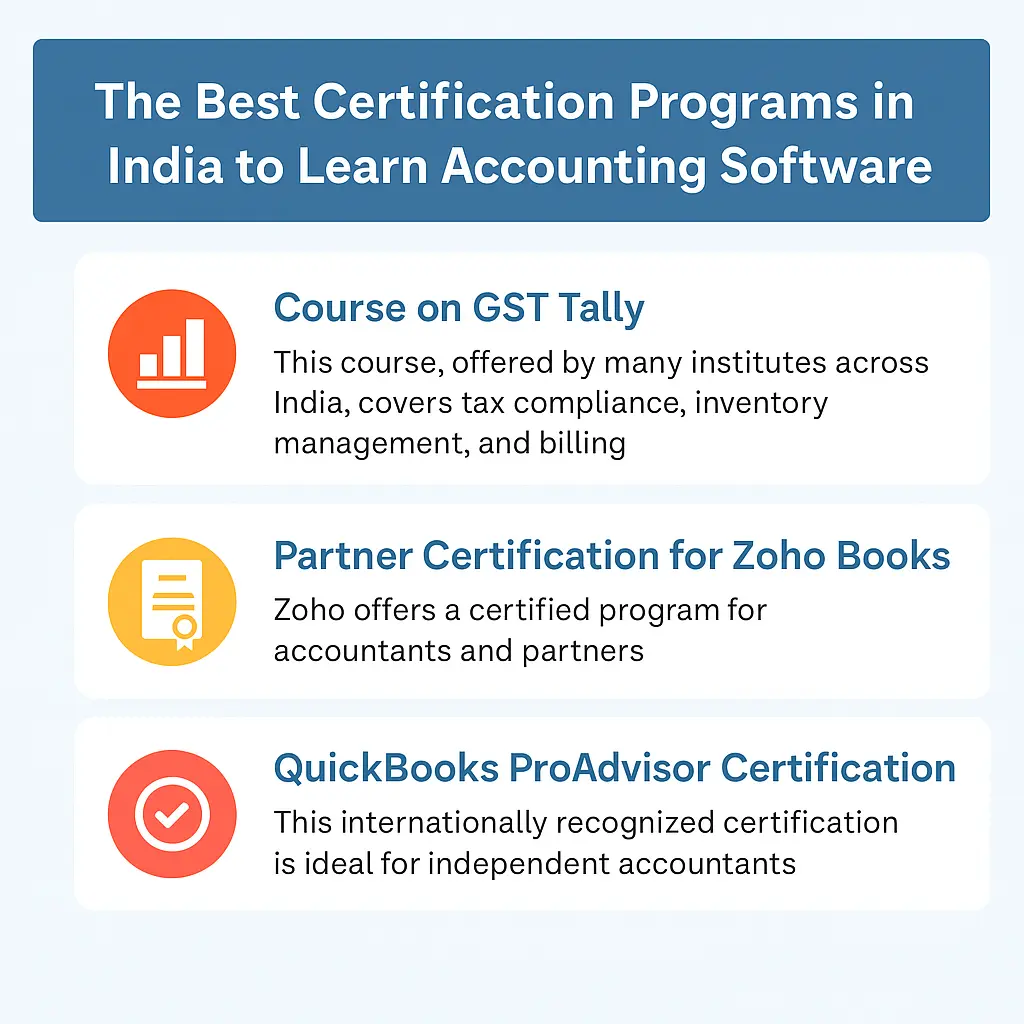
Skills on Demand in Addition to Accounting Software
If you’re serious about mastering the best accounting software in India, combine it with these skills:
Excel for Accountants The majority of accounting tools either import or export Excel reports.
Getting a Handle on Indian Taxation Knowledge of GST, TDS, and ITR filing is essential.
Soft Skills and Speaking Helps in client interaction and handling data with care.
